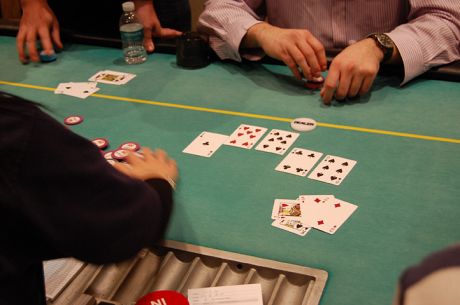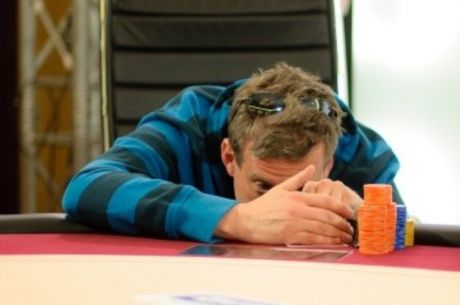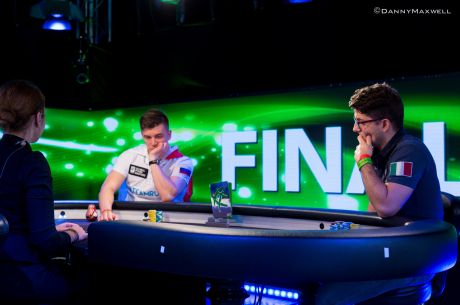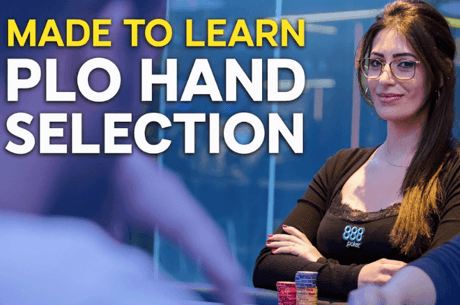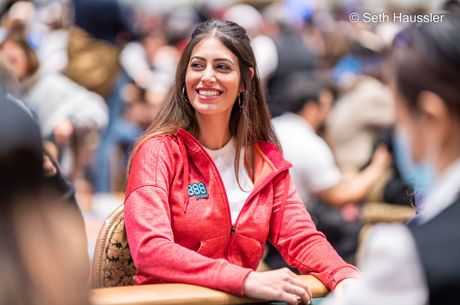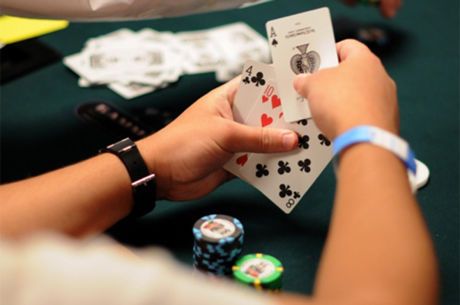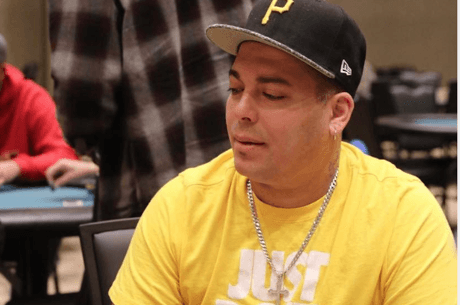Uncharted Territory: Making the Worst of a Short Stack?
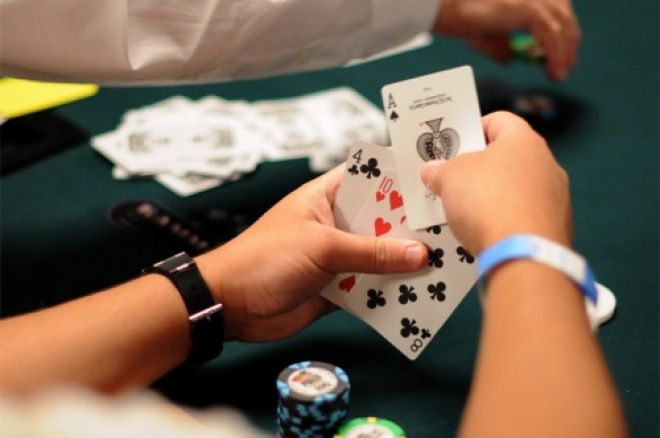
As we sussed out last time, we’re trying to make money, not chips, at a final table. To complicate matters the final table we are looking at, that of MiniFTOPS Event #32 on Full Tilt, is one featuring a foreign game called pot-limit Omaha.
During the last hand we discussed — when it was eight-handed and I was third-shortest in chips — I really had to worry about putting chips in the pot. In particular this was true because of the ubiquity of a chip leader on my left wielding a wrecking ball.
But by this hand matters have changed. I have moved up one spot in guaranteed money and am now lowest on the totem pole — seventh of seven. I should be willing to take on risk. Even though I think the player on my left will make me money as time passes, the clock is similarly ticking on my stack.
Here are the new stacks:
Middle Position (MP), Seat 1 — 16.5 BB
Cutoff (CO), Seat 2 — 45 BB
Button (BTN), Seat 4 — 12 BB
Small Blind (SB), Seat 6 — 14 BB
Hero, Big Blind (BB), Seat 7 — 9.5 BB
Under the Gun (UTG), Seat 8 — 117 BB
UTG+1, Seat 9 — 14 BB
In the big blind I am dealt A♣Q♠J♥8♠. The player in MP min-raises and it folds around to me.
The Price to Pay
As we discussed last time, the top-most big blind in any tournament stack is worth the least, the bottom-most the most. This is true whether you have ten big blinds or one hundred.
Being given 3.5-to-1 pot odds here, and with the price to call being our least valuable big blind, I have certainty I can call.
My hand’s equities against AxAxXxXx, KxKxXxXx, AxKxJxXx, and JxJx8x7x are 31%, 41.5%, 41.5%, and 50%, respectively. I should be able to realize enough of this equity.
The Absent Plan
After I called the flop came K♠8♣2♠. I checked, and my opponent bet 2 BB.
We know one thing, I must continue in this pot.
I don’t perceive a massive amount of fold equity in this situation. We don’t remove any kings from the deck with our hand, so most of our opponent’s bet-calling range is going to be AxKxXxXx, KxKxXxXx, and AxAxXxXx. Against those hands we have 45%, 32.5%, and 47.5% equity.
In retrospect, this is more than enough. Even if I don’t get many folds, I can put the money in here and not sweat it. I took a price preflop, connected with the flop sufficiently, and should be risk-loving. I called, perhaps erroneously.
When I call in this situation, I know I can check-call all in comfortably on the turn with nine spades and two eights. I can also check-call all in — less comfortably (but I am not folding) — on the three tens, three queens, two jacks, and two aces. I have a plan of check-calling all in on 21 cards, and I am paying 2 BB to win 6.5 BB on the flop. This seems like a well-formulated plan. (Or was it?)
Before we even account for the possibility that the turn checks through on one of the bad cards, I think we have a very profitable call on the flop given the above. When I called, then, I was hoping to make an even more profitable decision with my final 5.5 BB than check-raising all in on the flop provided.
The turn was the 9♣, possibly adding a flush draw for my opponent, but adding a gutshot draw to my hand. I checked, my opponent set me all in, and the price on my tournament life was 5.5 BB to win 16 BB. My hand had 36-38% equity versus AxAxXxXx hands, 25% versus KxKxXxXx, and 32.5% versus AxKxJxXx.
There is no way I can fold. But somehow I did. But... these are your last 5.5 BB, you say.
Let’s look at the stack layout after I fold. I have 5 BB effectively, as I’m paying the small blind next hand. Sure, I will have an orbit to decide when to put these into the pot and maybe someone will be coolered in the interim. But all other things equal, these five big blinds aren’t worth a lot. The 21 BB stack I could have the times I call off and win are worth a lot, though.
A Third Way
Though it only occurred to me some sixteen hours later, I could have preempted my opponent by moving all in on the turn myself.
Of course if the A♠ had come on the turn, I would know I had the nuts and in that case checking should be fine. That would also look like a card where fold equity would be available.
But we should not be trapping on all cards that improve us in some way. If I were to have moved in here on the 9♣ turn, I could be getting my opponent to fold a quarter of the pot’s worth of equity. And the principle advantage of moving in is the same argument for check-raising all in on the flop — we are putting in the last bet, a bet that might sometimes go uncalled, and therefore we aren’t always risking everything.
I think the worst course of action is the one I took, putting in chips to fold later. This, in part, boils down to not having a plan. Developing an intuition for pot-limit Omaha equities takes time — I hope at least. I certainly don’t have it at present.
Being overly prudential with one’s tournament life at a final table, with or without antes, can go too far. And went too far I did. I busted shortly thereafter.
Gareth Chantler is a professional poker player who encourages you to check out the interviews, videos, promotions, and strategy articles at the Full Tilt Blog.
Want to stay atop all the latest in the poker world? If so, make sure to get PokerNews updates on your social media outlets. Follow us on Twitter and find us on both Facebook and Google+!

